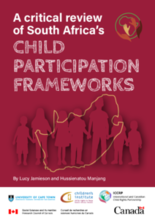This report interrogates the normative framework governing child participation in South Africa. It provides an analysis of international human rights obligations under the Convention on the Rights of the Child and the African Charter on the Rights and Welfare of the Child. The report outlines domestic legislation and policy, national development frameworks, and case law about families, health, social services, education, justice, and legislative processes and provides several examples of child participation in practice.
The analysis first assesses the normative framework against international obligations and then draws on the Lundy and Fokala’s conceptual models to examine whether it truly supports the principles of meaningful child participation. While the law declares that children have a right to influence key decisions in their personal lives, the planning and implementation of services and the development of laws and policies do not provide adequate measures to support them in exercising that right.
The report concludes that South African legislation and policy respects and protects children’s right to participate but fails to adequately promote and fulfil children’s rights; educate parents, caregivers and service providers on how to give effect to these rights; and provide resources necessary for meaningful participation.

